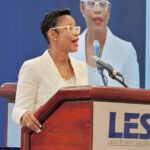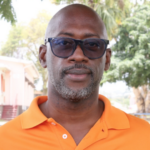Barbados is set to present a comprehensive Energy Transition Investment Plan at an upcoming international forum, detailing the investments, timelines, and sector-specific requirements needed to achieve its ambitious goal of 100 per cent renewable energy by 2030.
Minister of Energy and Business Senator Lisa Cummins, delivering the keynote address at the Barbados Chamber of Commerce and Industry’s (BCCI) Third Green and Renewable Expo on Tuesday, said the plan, developed in collaboration with the United Nations Special Envoy for Energy, will offer a clear roadmap for the island’s transition.
The plan is to be revealed at the Sustainable Energy for All Global Forum to be held here later this year.
“We can now tell you, by sector, how much investment it will take, how long it will take, and what quantum of the transition we expect to be completed by 2030,” she said.
She explained that the plan assesses three possible scenarios: maintaining the current pace of transition, accelerating the timeline to achieve full renewable energy by 2030, and adopting a longer-term transition extending to 2035.
The document, according to the minister, will provide the government, investors, and stakeholders with precise projections for costs and infrastructure needs across key sectors such as transport, heavy industry, and utilities.
Senator Cummins assured that the government’s commitment to renewable energy remains steadfast, but acknowledged that further work is required.
She said the Global Forum, hosted in Barbados later this year in collaboration with Sustainable Energy for All, will serve as a platform to finalise and launch the transition plan.
The energy minister, addressing business leaders and renewable energy stakeholders, also signalled a shift in focus towards incentivising more fixed-capacity and baseload renewable energy projects, which would provide a stable and reliable power supply beyond intermittent solar generation.
“We want to begin the process of incentivising more fixed-capacity projects,” she said.
“What does that look like? What does the business community have an appetite for? What does the business community want to see? And then, how do we frame a response to the investment community?”
She noted that the government would engage in consultations with investors and industry stakeholders to explore viable projects and ensure the energy transition aligns with market demand.
The expo, held to highlight and focus on the island’s renewable energy goals while providing an overview of the current status of achieving full transition by the next five years, was held under the theme Getting It Right for 2030.
Delivering the welcoming address, the Chairman of the BCCI’s Green Committee, Andy Armstrong, outlined the economic and health benefits of renewable energy, emphasising the urgent need to move away from fossil fuels.
“The World Health Organisation estimates that seven million people die each year from diseases linked to air pollution—the same number of global deaths recorded from COVID-19 since 2019,” he said.
Armstrong, who recently returned from a visit to Vietnam, compared the hazardous air pollution levels in Southeast Asia to Barbados’ relatively clean air.
He noted that Hanoi, one of the world’s most polluted cities, recorded air quality levels “over 1 000” in December, compared to Barbados’ average of “20 to 30”, describing the local atmosphere as “far superior” despite challenges.
It was not immediately clear what air quality measurement Armstrong referred to but according to the World Health Organisation (WHO), Barbados is rated 20–49 on the Air Quality Index (AQI), which is considered fair. This means that the air is generally acceptable for most people, but sensitive groups may experience minor to moderate symptoms over time. By contrast, Hanoi recorded air quality levels over 1 000 on some indices, which suggest severe pollution.
Armstrong said: “The main cause of air pollution is the burning of fossil fuels. If we phase out fossil fuels and move all vehicles to zero emissions, that will have a positive impact on global health and the environment.”
He argued that beyond these benefits, renewable energy makes economic sense, as the cost of wind and solar generation, when coupled with storage, is now cheaper than power generated from fossil fuels in many markets.
Noting that international investors have been keeping a close eye on Barbados’ progress, Senator Cummins stressed that the forum will provide a platform for strengthening partnerships and attracting new investment into the sector.
She described the transition as a “common journey” that requires participation from all stakeholders, including government, businesses, utilities, consumers, and international partners.
“Today is a call to action that sees the demarcation in the sand from 2019 to 2023 and a commitment that we have a new way forward,” Senator Cummins said.
“[One that prioritises] storage, generation, new investments, regulatory frameworks, and new local and international collaboration and sees everyone walking together toward a 2030 target of transitioning to 100 per cent renewables.”
(SM)
The post Ambitious renewable energy transition plans appeared first on Barbados Today.


